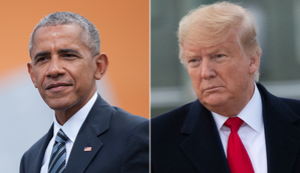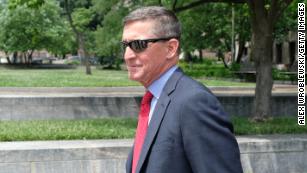Cornered by the coronavirus, Trump returns to a familiar strategy: Attack Obama
With the death count from the coronavirus rising and its economic fallout deepening, President Donald Trump is trying to fire up his base and divert the national conversation by promoting a baseless conspiracy that casts his predecessor, Barack Obama, as the architect of a plot to subvert his presidency.
The ginned up scandal, or "Obamagate" as Trump has branded it, turns on alleged requests made by members of the Obama administration to "unmask" an individual, who turned out to be Michael Flynn, mentioned in classified intelligence reports. A common and legal process, it has been employed more often under Trump than during Obama's time in office.
This week the Trump administration and Republican senators made the decision to declassify and release the names of Obama officials who made requests that might have resulted in Flynn's "unmasking." The officials would not have known the name of the individual until after their ask was answered. Flynn would go on to become Trump's national security adviser before being fired -- by the President -- for lying to White House officials about his Russia contacts.
Visit CNN's Election Center for full coverage of the 2020 race
The decision to place Obama at the center, rather than the candidate challenging him in November, former Vice President Joe Biden, underscores Trump's increased agitation over his waning ability to shape a news cycle dominated by a virus that has killed more than 85,000 Americans and leveled the economy. It also fits a familiar pattern, dating back to years before Trump's 2016 campaign, of crafting and promoting smears of Obama, like the racist and false charge that the country's first black president was not a natural born US citizen.
Early returns suggest the pivot will be embraced by Trump loyalists, like those at Fox News, but outside that bubble -- where Obama remains one of the country's most popular figures -- the President risks blowback from the softer edges of his support, particularly in the suburbs that rejected Republican congressional candidates in 2018.
An abrupt turn
Trump's growing fixation on Obama is most sharply evident across his social media feeds. In the month of April, he mentioned, in tweets and retweets, the former president fewer than 10 times. Less than halfway through May, Obama's name has appeared more than twice as often, including multiple references to "Obamagate." The most retweeted mention featured the word alone, in all-caps, with an exclamation point -- on Mother's Day.
A senior Trump campaign official said they would continue to question the Obama administration's handling of the Flynn affair as part of their efforts to discredit the Russia investigation. There would be "no daylight" between the campaign's official position and Trump's personal messaging, said Erin Perrine, the Trump campaign's principal deputy communications director.
What to know about Michael Flynn as his case hangs in legal limbo
But Trump's own allegations of wrongdoing by Obama and his team have been difficult to decipher. The "unmasking" process is routine across administrations and there is no evidence to suggest any Obama officials acted out of line in requesting it. Even some Trump loyalists have said proper procedure was followed. The leak of Flynn's name shortly before Trump took office, though illegal, has featured less prominently in the narrative. Asked repeatedly over the last week to provide specifics to his charges, the President has spoken in confounding circles.
"It's been going on for a long time," Trump said on Monday at White House press conference. "It's been going on from before I even got elected. And it's a disgrace that it happened. And if you look at what's gone on, and if you look at, now, all of this information that's being released -- and from what I understand, that's only the beginning -- some terrible things happened, and it should never be allowed to happen in our country again."
Pressed by a reporter to explain what "crime exactly" he is accusing Obama of taking part in, Trump demurred.
"You know what the crime is," he said. "The crime is very obvious to everybody."
The Biden campaign has mostly brushed off or ignored Trump's latest round of attacks. In a statement to CNN, Biden spokesman Andrew Bates scorched Trump over his handling of the coronavirus pandemic.
"Donald Trump is desperate to focus on anything but his continuing failure to do his job with respect to the worst public health crisis in 100 years," Bates said. "Trump didn't build a great economy - he destroyed the great economy that he inherited from the Obama-Biden Administration by failing to act on coronavirus. He disregarded warning after warning, including public calls by Joe Biden for him to show leadership and prepare the country, while giving more credence to Chinese government propaganda than his own scientists and intelligence experts. Now over 85,000 Americans have died and the country is reeling from Great Depression-level job losses."
Jesse Lehrich, the former communications director at Organizing for Action, a group that grew out of the first Obama campaign, and a Hillary Clinton aide in 2016, argued that Trump is targeting Obama -- over Biden -- in a ploy to reclaim his grip on a news cycle dominated by the coronavirus disaster.
"There's a degree to which attacks on Biden are just not big enough -- they're too old and obvious to drive news," Lehrich said. "Trump can't even explain what 'Obamagate' is. What is it? He doesn't know. He's just retweeting things."
Attempting to frame the former president in a sinister light has been a politically profitable enterprise for Trump in the past.
Before launching his 2016 campaign, Trump emerged as a leader of the "Birther" movement, which questioned whether Obama had been born in the US, helping inject a fringe, conspiracy theory into the mainstream. Soon after taking office, Trump sought to deflect reports of Russian interference in the last election by accusing Obama of ordering wiretaps of Trump Tower.
Throughout his time in the White House, Trump has alternately sought to dismantle Obama's legislative legacy, the governmental infrastructure he left behind and blamed the former president for any downturn in his own political fortunes. As the coronavirus spread, the President zeroed in on Obama, claiming his predecessor left the country ill-prepared for a pandemic Trump repeatedly downplayed in the early stages.
At around the same time, the administration sought to shut down, before scrambling to reverse course months later, a US Agency for International Development surveillance program charged with detecting and combating emerging threats. Among the other tools left to Trump by Obama's National Security Council: a 69-page playbook for responding to a global pandemic.
Obama has not responded directly to Trump's most recent round of provocations. On Thursday, though, he offered his own one-word tweet: "Vote."
Potential for backfire
Trump's twin efforts to portray Obama as both savvy enough to execute a plan to sabotage his presidency but too bumbling to adequately prepare for a public health crisis might play well with his committed base, but the former president has proven to be a durably popular figure.
In a June 2018 survey, the Pew Research Center found that 44% of Americans named Obama as the first or second-best president of their lifetimes. He was the top pick for more than three-in-ten, leading the pack by both measures, more than 10 percentage points ahead of Ronald Reagan, his closest competition. Obama and Trump tied in a Gallup poll measuring the "most admired man" in the US in 2019, which marked Obama's 12th consecutive appearance in the top slot.
Asked about suggestions that targeting a popular former president could backfire among the broader public, Trump campaign spokesman Matt Wolking touted the names of the Obama administration officials declassified by the Trump administration and released by Trump's allies in the Senate as "stunning new information" that would undermine "Biden's myth that there was zero scandal during his time as Vice President."
Whether that line of attack, a remix of what Trump has said -- in the face of clear evidence to the contrary -- for years now, helps him build a clear case for reelection during a devastating, unrelated health and economic crisis, is an open question.
Democrats, led by Biden and his team, appear confident for now that their best bet is to ignore the noise and keep their message focused on Trump's coronavirus response.
"To the extent that I would engage on the Obama attacks, it would be only to drive contrast on how seriously the Obama-Biden administration took their responsibility to keep the American people safe, and the preparations they took to mitigate potential crises," Lehrich said. "As opposed to engaging on the things that Trump wants to discuss. As outrageous as they are, they just aren't important."
CNN's Marshall Cohen contributed to this story.













